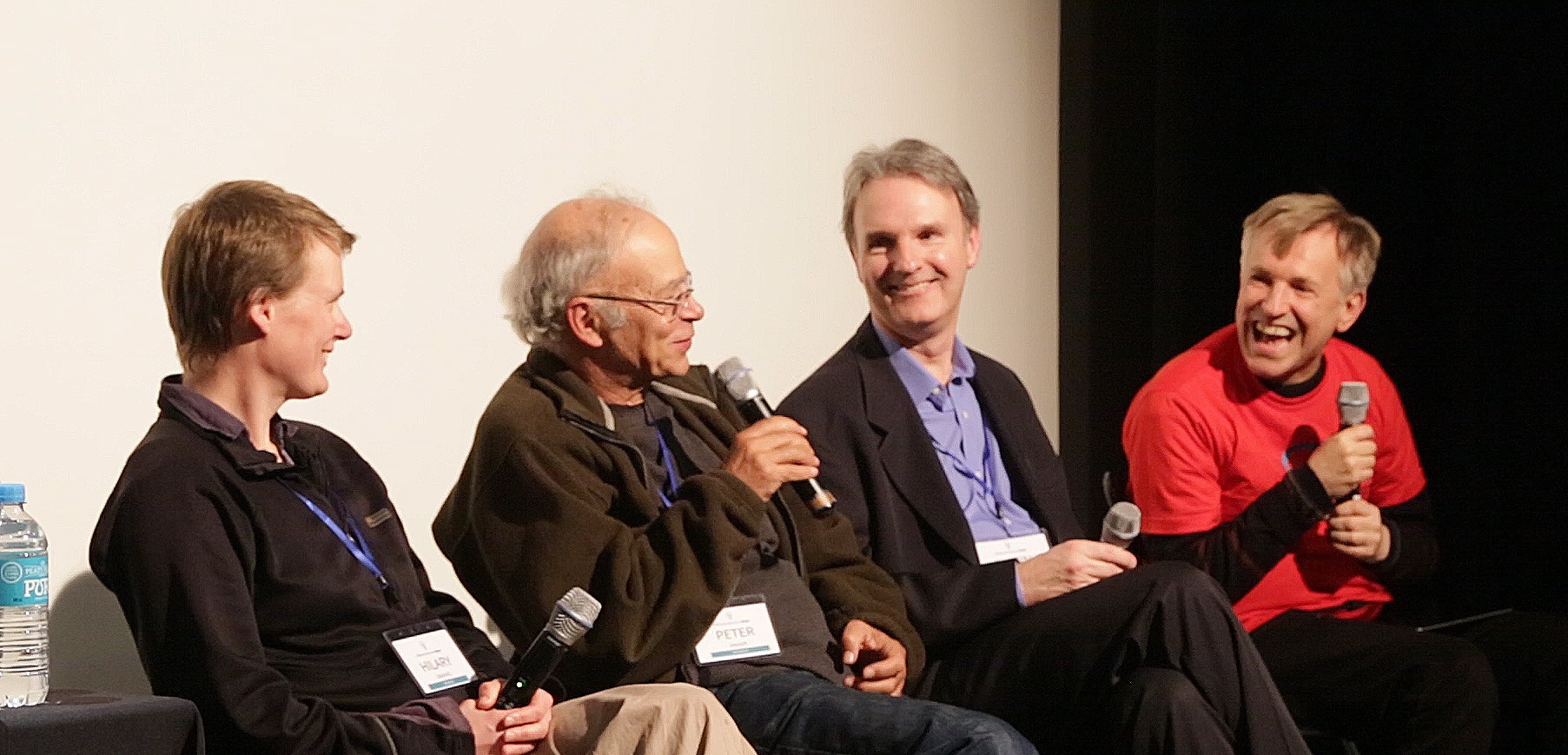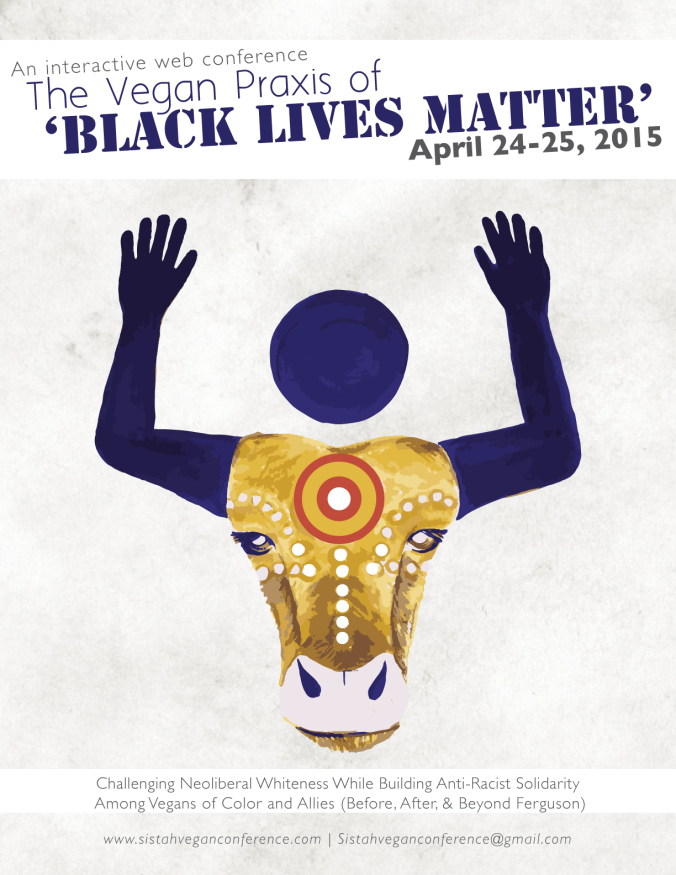A few years ago, I was considering attending Colorado VegFest 2014 until I read the program and changed my mind. Almost every single presenter appeared to be white and male. I wasn’t the only person to notice this. Several concerned activists raised the issue with the program organizers, and were, to my dismay, met with strong resistance. Because we were critical of the program’s male-centrism, we were curiously accused of being sexist ourselves. Moreover, we were told we were ruining activism “for the animals.”
Because these reactions are so common to feminist critique no matter how politely or compassionately that critique is offered, it is worth exploring why these responses are both inappropriate and oppressive.
Gender Inclusivity is Not Sexist
When feminists ask that more women be included in speaking events, it is not an insinuation that men are not capable of having good ideas and should be barred from participation. It is only asking that women be actively included with the understanding that women have been consciously and unconsciously excluded from participating in the public discourse for centuries.
This is not sexism against men because, under patriarchy (a system of male rule), men cannot be victims of sexism. “Reverse sexism” is a trope designed to protect male privilege and deflect criticism, but it lacks empirical support. The institutions of patriarchy are designed to privilege men, therefore, men cannot be the victims of sexism when women challenge this privilege.
Gender Inclusivity is Not Speciesist
Lamenting “the animals” who are presumably hurt by efforts to improve diversity is another distraction technique. It takes the blame away from those responsible for the problem (almost always persons protecting their privilege) and puts it on those who are drawing attention to the problem (usually marginalized persons). “Won’t somebody please think of the animals!” rhetoric protects structures of inequality.
Emphasizing the urgency of Nonhuman Animal suffering (“RIGHT NOW!”) eliminates the potential for civil discourse and careful thought, both of which are necessary for effective activism. No time to think, animals are suffering! This trope exploits the torture and death of Nonhuman Animals to maintain privilege and inequality.
Failing to Assume Responsibility is Sexist
Most gatekeepers in the Nonhuman Animal rights movement are unwilling to accept responsibility for institutional discrimination. To a point, this is understandable. Very few persons today are explicitly sexist or racist; most engage in implicit or unconscious prejudice and stereotyping. You do not have to identify as sexist to be sexist. In fact, many people who believe themselves to be champions of women are actively engaged in sexist systems.
The majority of us theoretically support egalitarian ideals, which is good news, of course. Yet, this superficial support also makes challenging the many barriers that remain all the more difficult. Marginalized groups today are harmed by institutional discrimination far more than interpersonal prejudices and discriminations. Even if you personally do not feel you are sexist or racist, that does not mean sexism or racism doesn’t exist.
Sexism and racism are both structural, but most interpret these systems as individual. In this case, VegFest panel organizers were confronted with the presence of sexism and racism and interpreted our feminist critique to mean that they themselves (not the institution they represent) were being labeled sexist and racist. They reacted with more individual-level thinking, reversing the contention by insisting that it was we the complainants who were the truly sexist and racist persons. By this schoolyard logic, any acknowledgement of white male privilege is inherently sexist and racist. But acknowledging gender, race, and difference in representation and opportunity is not bigotry. Such a framework invisibilizes the very real systems that insure that this panel and most panels in the Nonhuman Animal rights movement have a race and gender problem.
Solutions of Responsibility
Blaming the complainants is only one tactic. Blaming the disenfranchised is another popular approach.
Ignoring systems invites a deflection to the most vulnerable. Too uncomfortable to consider that their own biases might somehow be responsible for the lack of diversity, organizers lazily insist that it is simply the case that no women or people of color were available or interested. Again, this response inappropriately individualizes a systemic problem. Institutions wield incredible privilege in normalizing agendas and discourse. They also wield incredible privilege in acting as gatekeepers and setting standards and values for their audiences.
Men and whites (and especially a combination of the two) must take responsibility for sexism and racism in the movement. Even if these persons do not feel they are racist or sexist, they nonetheless benefit from these systems and are thus morally obligated to acknowledge and resist them. Allies should, first, contact organizers and express their disappointment with the lack of diversity. They should, second, withhold their services or patronage until diversity is improved.
In a movement that is 80% female, there is no excuse for an all-male or nearly all-male group of speakers, contributors, or leaders. Race is more complicated. The overwhelming whiteness of the activist pool indicates that many people of color–who also care about other animals and practice veganism–rightfully avoid the movement and either abandon activism or create independent collectives. Those who remain are vulnerable to exploitation, over-extended to fulfill diversity quotas and often used as tokens.
Conclusion
I am of the position that most of these events are wastes of precious few resources. I recognize that creating community is essential to retaining vegans, but conferences and fests are not explicitly “for the animals.” The majority of event goers, I suspect, are not uninitiated persons, but rather persons who are already vegan or vegetarian. These events are predominantly sites of fundraising, career advancement, personal entertainment, and celebrity worship. They are not “about the animals” so much as they are about humans.
Diversity disrupts the historical use of conferences as spaces to engage in and enjoy privilege. If these conferences were truly in the business of spreading vegan ideals, they would embrace diversity rather than accuse women and other disenfranchised groups of being discriminatory themselves simply for requesting representation. A movement that belittles and trivializes the marginalization of human groups will be unwelcoming and ineffective for other animals. If the community believes that conferences matter, then they must become relevant and inclusive.
 Dr. Wrenn is the founder of Vegan Feminist Network. She is a Lecturer of Sociology and Director of Gender Studies with a New Jersey liberal arts college, council member with the Animals & Society Section of the American Sociological Association, and an advisory board member with the International Network for Social Studies on Vegetarianism and Veganism with the University of Vienna. She was awarded Exemplary Diversity Scholar 2016 by the University of Michigan’s National Center for Institutional Diversity. She is the author of A Rational Approach to Animal Rights: Extensions in Abolitionist Theory.
Dr. Wrenn is the founder of Vegan Feminist Network. She is a Lecturer of Sociology and Director of Gender Studies with a New Jersey liberal arts college, council member with the Animals & Society Section of the American Sociological Association, and an advisory board member with the International Network for Social Studies on Vegetarianism and Veganism with the University of Vienna. She was awarded Exemplary Diversity Scholar 2016 by the University of Michigan’s National Center for Institutional Diversity. She is the author of A Rational Approach to Animal Rights: Extensions in Abolitionist Theory.




